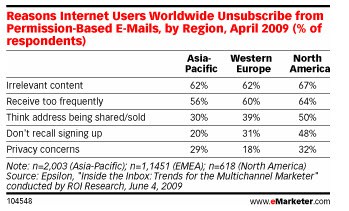Marketers often have a “gut feel” – they simply “know” they are “right” about something. Often, this turns out to be true; much psychological research shows that “gut feel” is surprisingly accurate. However, “gut feel” can also be wrong – as many Internet marketers will tell you. They have assumed something to be true – such as a particular market demand, only to discover that no-one actually wants what they are selling.

Testing is the only true way to find out; studying your audience behaviour, analysing poll results – whatever you do, research should be the basis of your success, not assumption. All too often, business owners set aside research because of lack of time, or lack of funding. The result is that they can often go down dead-ends, safe in their “knowledge” that they are doing the right thing. Later on, of course, they discover they need to change their strategy, having wasted an inordinate amount of time.
Assumption is the enemy of business. Assuming that you know what your market wants often leads to rapid failure. Today, for instance, is the 25th Birthday of Virgin Atlantic, a company based on constant market research and customer understanding. Meanwhile, loss-making British Airways is asking its staff to work without pay – an airline often remarked upon for its comparative arrogance and diffidence, the markers of assumption.
Online, you can find all sorts of assumptions about doing business on the Internet. People will telll you that you “must” do this or “must not” do that; but when you ask for evidence they can’t provide it. There are 70m people saying at the moment that you simply “must” use Twitter to market your business; but they fail to recognise that there are many successful worldwide enterprises earning more money each month online than many of the so-called Twitter marketing experts have done in a decade all without using a single Tweet. Equally, there are Internet marketers who will tell you that you should never send out email marketing campaigns on a Friday as no-one will read them over the weekend. Tell that to Tesco who do rather nicely out of email marketing, thank you very much.
And talking of email, how about the so-called experts who say that you must demonstrate your email security very well, because that’s the “number one” reason why people unsubscribe? Luckily we now have evidence to prove them wrong. A new study shows that a surprisingly low number of people unsubscribe from email marketing campaigns they have signed up to. According to the research around a third of people only rarely or never unsubscribe, with only 14% of people “frequently” unsubscribing. If you have an email list, you will find that the people on it are remarkably loyal.
 However, the new study also shows the main reason why people do hit the unsubscribe button – the world over the reason is the same says the new research, lack of relevant content. Although the research also showed that getting emails too frequently was a problem for up to two thirds of recipients, part of that is wrapped up in the content issue. If you receive an email only occasionally with irrelevant content there’s a probability you will give the senders a second chance. But if you get irrelevant emails frequently, your patience wears much thinner and you unsubscribe more quickly.
However, the new study also shows the main reason why people do hit the unsubscribe button – the world over the reason is the same says the new research, lack of relevant content. Although the research also showed that getting emails too frequently was a problem for up to two thirds of recipients, part of that is wrapped up in the content issue. If you receive an email only occasionally with irrelevant content there’s a probability you will give the senders a second chance. But if you get irrelevant emails frequently, your patience wears much thinner and you unsubscribe more quickly.
Here’s what lies beneath those research figures; if the content is relevant, too many emails doesn’t become a problem. Indeed, if you provide relevant content to your list, the real problem then becomes too few emails sent out.
In other words, assumption is beating many companies here. They assume that by sending out too many emails they will annoy their mailing list and thereby lose audience. So they only send out occasional emails. But this research shows that such companies should be sending out more emails – but with much more relevant content to specific audiences.
As always, content wins. Instead of worrying about the right frequency for your email newsletters and marketing campaigns, focus in on providing more of the right content for your audience. And if you don’t know what that should be – research it. Find out, ask your subscribers – and if necessary produce more targeted, more specific email campaigns for subsets of your list. That way you’ll engage you audience much more and reduce your unsubscribe rate. And if you do all that, like Virgin Atlantic you too can celebrate 25 years of successful business.
